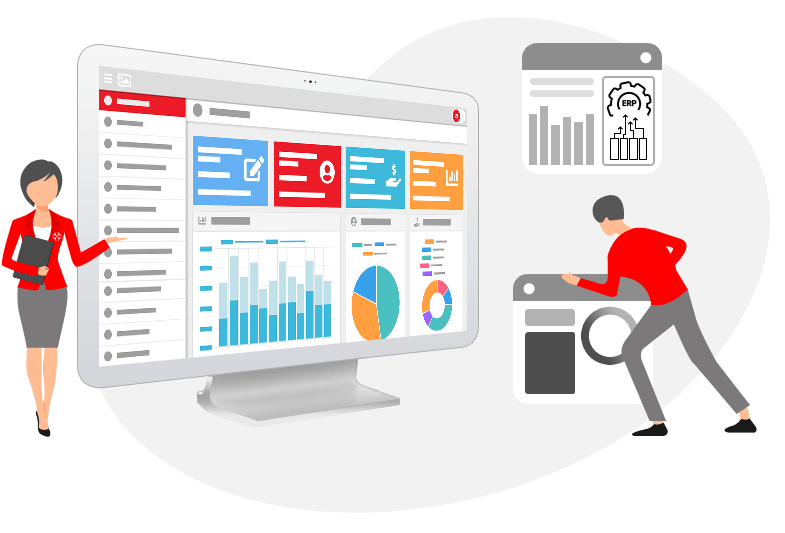“The integrated management of main business processes in real time augmented by software technology”.
Customized ERP Development
A customised ERP system includes features like that of an integrated system that operates in real time, a standard database that supports such applications and a reliable link across sections. Distribution of such ERP systems include, locally or cloud hosted. The most common functional areas of an ERP system are the financial or accounting sector, management sector, supply chain, project management, Customer relationship, manufacturing sector and various business support systems which are referred to as ERP modules. ERP systems incorporate the vendor's interpretation in the most effective way and perform each business process conveniently. ERP systems hook up with real time data and transaction data during a sort of ways. These systems are typically configured by those, who bring about unique knowledge on processes, hardware, and relevant solutions.
Direct integration ERP systems have connectivity as a part of their product offering. Database integration ERP systems hook up with plant floor data sources through staging tables during a database. Plant floor systems deposit the required information into the database. The ERP system reads the knowledge within the table. The advantage of staging is that ERP vendors don't got to master the complexities of kit integration. Connectivity becomes the responsibility of the systems integrator. Custom integration solutions certain specialised system integrations offer custom solutions. These systems tend to have the highest level of integration and a long term maintenance and reliability costs. A careful system analysis can certainly bring about cost reduction to a great extent.
Work station computers are the preferred choice to run custom integrated solutions significant changes can be brought about by the implementation of the ERP. Although the execution is dependent on the business magnitude, the intention of which it is considered remains the same. ERP systems can be implemented in stages. The typical project for a large enterprise takes time and requires more work forces whereas Small projects do not require much time and work force. However customization can substantially increase implementation times. Implementing ERP typically requires considerable changes in existing business processes. It is therefore crucial that organizations thoroughly analyse business processes before they implement ERP software.
Xsosys has the credit of developing and deploying customized ERP solutions to reputed clients like courts mega store which has been accepted and acknowledged as one of the creative and innovative ERP solutions.
Fully Integrated and Customizable Modules for ERP Systems
ERP System Main Modules
Project Management Task Management Customer Relationship Management Human Resources Management Financial Management Sales & Marketing Time Management Service / Maintenance ManagementSubmodules
Reports Module Customers and Orders Management Tools Workload Management Tools Manufacturing Module Financial Module Supply Chain Management Module Time Tracking System Client Database CRM Module Projects Dashboards Invoices DatabaseThe Benefits of Having Custom ERP Software
Custom Integration Solutions
Our custom System Integration solutions in the industry typically provide the product and application experience in implementing complex automation solutions. Aligned with automation vendors, joining their various System Integration programs for access to development products, resources and technical support our solutions are viewed as the long term failsafe solutions.
Keeping Data in Server Location
Data stored in a digital, machine-readable medium is called digital data. Data storage and distribution as and when needed is one of the core functions of a server. Advantages include documents can be stored in much less space than paper documents and in an organized way, with less hassles and cumbersome manual processes. The documents thus preserved in this manner also can be assured of a considerable amount of security as well and can be instantly retrieved upon use.
Comprehensive Reporting
Comprehensive Data reporting is the process of collecting and submitting data which gives rise to accurate analyses of the ground realities hence inaccurate data reporting can lead to vastly uninformed decision-making based on erroneous evidence which apparently leads to false positives. The effective management of accurate data and its reporting to the designated departments is one of the key features of the System.
Project Implementation
While executing the project during the implementation stage the planned terms that need to be executed are thoroughly reviewed thereby ensuring that the project management deliverables are executed accordingly. Though this phase involves proper allocation, co-ordination and management of human resources and other resources such as material and budgets the output of this phase is carried out flawlessly.
Security ERP software
Since ERP systems process transactions and implement procedures to ensure that users have different access privileges it is very necessary to integrate a range of measures aimed at protecting Enterprise resource planning (ERP) systems from illicit access. The ERP system provides a high level of security to the inside data and the mechanisms of the systems as well.
ERP Implementation
The implementation of is the final link in the deployment chain of the stages of the development. The ERP implementation is done on a blueprint referral basis to get users organizations to get properly accustomed and understand the specific usage of the system. It is a set of rules and views to cope with the most common issues that occur when using the product.












